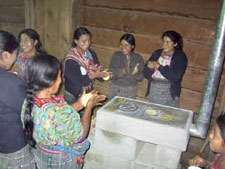
As part of PCIA's integration with the Global Alliance for Clean Cookstoves, the PCIA website has transitioned to a legacy website. The resources that were produced over the past 10 years of the Partnership are still accessible on this website. However, the content will no longer be updated as of June 1, 2012.
About PCIA
More than half of the world’s population—three billion people—cook their food and heat their homes by burning coal and biomass, including wood, dung, and crop residues, in open fires or rudimentary stoves. Indoor burning of solid fuels releases dangerous particulate matter, carbon monoxide, and other toxic pollutants, and releases greenhouse gases into the air. The resulting indoor air pollution levels are 20 to 100 times greater than the World Health Organization’s (WHO) air quality guidelines allow. Unfortunately, the health risks and threats to the environment are on the rise: the International Energy Agency estimates that 200 million more people will use these fuels by 2030.
WHO estimates that 1.5 million people die prematurely each year from exposure to indoor smoke from burning solid fuels. In fact, indoor air pollution from household energy is ranked fourth in the list of serious threats to health in less developing countries, after malnutrition, unsafe sex, and unsafe water. Women and children face the greatest risks. Breathing unsafe levels of smoke indoors more than doubles a child’s risk of serious respiratory infection and is associated with pregnancy problems, such as stillbirth and low-weight babies.
To address this challenge, a group of committed organizations joined forces in 2002 at the World Summit on Sustainable Development to launch the Partnership for Clean Indoor Air (PCIA). In 2010, key PCIA Partners reported helping approx. 2.5 million households to adopt clean cooking and heating practices, reducing harmful exposures for more than 15 million people.
The Partnership's Mission
A total of 590 public and private organizations joined the Partnership for Clean Indoor Air between 2002 and 2012, contributing their resources and expertise to improve health, livelihood, and quality of life by reducing exposure to indoor air pollution, primarily among women and children, from household energy use.
The Partnership focused on four priority areas which have proved to be essential elements for sustainable household energy and health programs in developing countries: (i) Meeting Social/Behavioral Needs; (ii) Developing Local Markets; (iii)Improving Technology Design and Performance; and (iv) Monitoring Impacts of Interventions.
Our Approach
Capacity Building – The Partnership provided in-depth technical training in community outreach and education, stove design and performance, market development, and indoor air pollution and socio-economic impact monitoring, the four priority areas for sustainable programs. The Partnership also supported active information exchange to help researchers, entrepreneurs, project implementers, and program directors learn from one another through regional workshops and international meetings and forums. Proceedings from past events are available at www.pciaonline.org/proceedings.
Technical Assistance – The Partnership supported stove testing and technical training and offered technology design and performance guides to increase the capacity of Partners to design and manufacture clean, efficient, and safe cooking and heating technologies.
Project Implementation – Partners are implementing projects in Asia, Africa, and Latin America. These projects integrate successful outreach and education models, market-based solutions that promote local business development, and effective monitoring to track emission reductions and other benefits. Learn more about our Partners and their work at www.pciaonline.org/partners/search.
Knowledge Management – The Partnership published the quarterly PCIA Bulletin, which highlighted the activities of the Partnership and its Partners around the world to raise awareness about issues related to indoor air pollution, household energy, and health. This website provides access to past issues of the Bulletin, background information on household energy and health, access to PCIA publications, and other important resources. Please visit www.pciaonline.org/resources to access these resources.
